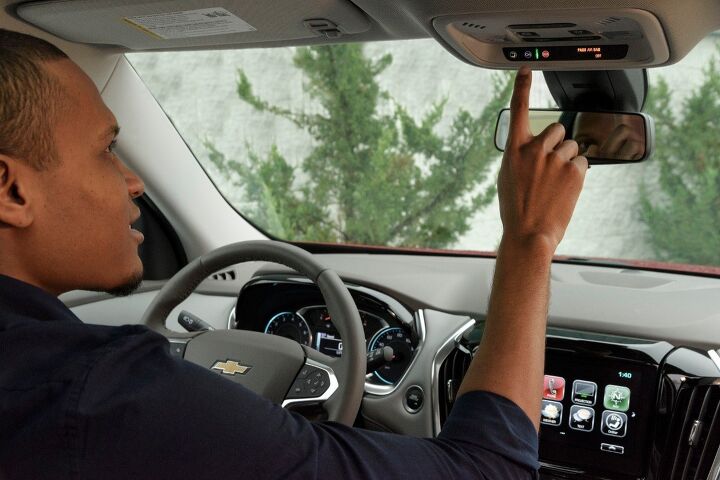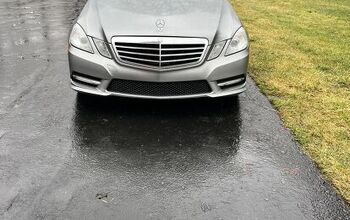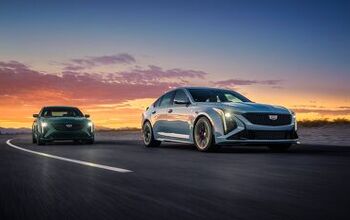Driving Dystopia: Automakers Are Selling Your Driving Data to Insurance Companies

A recent report from The New York Times has accused automakers of selling customer driving data to insurance firms. While this is something many drivers had already been made aware of since the implementation of connected vehicles, the outlet claims that the amount of data has ramped up to a staggering degree. Not only is the amount of data being shared staggering, so is the specificity and degree to which it’s impacting people’s insurance rates.
The report focuses on LexisNexis’ “Risk Solutions” program formerly dedicated to keeping track of accident reports and moving violations. However, the division has expanded dramatically over the years and now oversees just about every scrap of relevant data modern vehicles can accumulate about you.
Investigations commenced after Kenn Dahl, a Seattle-based gentleman who drives a Chevrolet Bolt, noticed his insurance premiums shot up by 21 percent in 2022. When he opted to explore other agencies, he noticed they likewise seemed to be much higher than normal. Inquiring with one agency as to why, he was told his LexisNexis report could be a factor.
Using the Fair Credit Reporting Act to obtain a copy of his report, Dahl was confronted with a 258-page consumer disclosure document outlining just about everything that had been done with the vehicle.
From NYT:
What it contained stunned him: more than 130 pages detailing each time he or his wife had driven the Bolt over the previous six months. It included the dates of 640 trips, their start and end times, the distance driven and an accounting of any speeding, hard braking or sharp accelerations. The only thing it didn’t have is where they had driven the car.
On a Thursday morning in June for example, the car had been driven 7.33 miles in 18 minutes; there had been two rapid accelerations and two incidents of hard braking.
According to the report, the trip details had been provided by General Motors — the manufacturer of the Chevy Bolt. LexisNexis analyzed that driving data to create a risk score “for insurers to use as one factor of many to create more personalized insurance coverage,” according to a LexisNexis spokesman, Dean Carney. Eight insurance companies had requested information about Mr. Dahl from LexisNexis over the previous month.
“It felt like a betrayal,” Mr. Dahl said. “They’re taking information that I didn’t realize was going to be shared and screwing with our insurance.”
Insurance groups formerly had to engage with customers to install tracking devices that would monitor “safe driving” under the guise of offering discounts. While these systems originally had to be installed under the hood of your automobile, later examples have included phone apps and giving automakers permission to share connected-vehicle data with insurance firms.
That information is then utilized to raise premiums whenever someone is caught in a moment of exuberant driving. However, there used to be more barriers in place for insurance agencies to gain access.
That’s no longer necessary with connected vehicles. Automakers stand to profit off selling customer data and insurance agencies want the information so it can be leveraged to raise their rates or find excuses to deny people coverage. This outlet recently suggested that in-cabin cameras (something that’s presently being encouraged by the automotive lobby and IIHS) will be used to similar effect and we’ve already started to see this being done with the exterior camera arrays that are now ubiquitous.
Sadly, it looks like the industry is no longer asking for consent — at least not directly.
The New York Times noted that several automakers (referencing General Motors, Kia, and Hyundai) have tied data sharing to optional features that may include some kind of safe driving app. Once activated, the systems relay information to data brokers who then sell the information to insurance firms and whoever else is paying. But it actually might be worse than that. The above supposes that customers are unwittingly falling into data traps by not reading the fine print.
However, a previous report by the Mozilla Foundation asserted modern automobiles are the absolute worst device in terms of user privacy. The takeaway is that almost every vehicle brand under the sun is harvesting vast amounts of user data without explicitly asking for their consent and that most will go on to sell that information to data brokers around the globe.
All told, 84 percent of automotive brands were found to sell or share user information and 92 percent gave drivers little to no control over what happens to their personal data. While some brands were found to be entering into less egregious behavior than others, all were cited as failing to reach the most basic threshold for meeting Mozilla’s Minimum Security Standard.
Considering just how much information modern devices are now racking up about people, it seems reasonable that drivers should have to provide explicit consent. But most automakers, like tech companies, tend to hide those permissions in expansive terms and conditions agreements nobody bothers to read. There have even been instances where drivers were tracked by features they hadn’t even activated — such as GM’s OnStar Smart Driver.
“GM’s OnStar Smart Driver service is optional to customers,” explained GM spokeswoman, Malorie Lucich. “Customer benefits include learning more about their safe driving behaviors or vehicle performance that, with their consent, may be used to obtain insurance quotes. Customers can also unenroll from Smart Driver at any time.”
But the issue is that customers likely don’t know that and the NYT article goes out of its way to explain this even when someone actively decides to enroll in the Smart Driver program. No mention was given about the information being shared with third parties. In fact, some drivers probably don’t even know they have it on their vehicle due to the fact it’s incentivized by sales personnel at dealerships and the system is frequently activated at the point of sale.
GM continued getting attention from the outlet, which noted that the same company that’s sharing data that could result in higher insurance premiums is also selling high performance models. One owner even claimed that his insurance premiums went off after taking his Corvette to a track day, suggesting data collection doesn’t care whether you’re on public streets or a closed course.
Numerous people on the [GM] forums complained about spiking premiums as a result. A Cadillac driver in Palm Beach County, Fla., who asked not to be named because he is considering a lawsuit against G.M., said he was denied auto insurance by seven companies in December. When he asked an agent why, she advised him to pull his LexisNexis report. He discovered six months of his driving activity, including many instances of hard braking and hard accelerating, as well as some speeding.
“I don’t know the definition of hard brake. My passenger’s head isn’t hitting the dash,” he said. “Same with acceleration. I’m not peeling out. I’m not sure how the car defines that. I don’t feel I’m driving aggressively or dangerously.”
When he finally obtained car insurance, through a private broker, it was double what he had previously been paying.
The Cadillac owner, Mr. Dahl and the drivers on the forums had all been enrolled in OnStar Smart Driver. OnStar is G.M.’s Internet-connected service for its cars and Smart Driver is a free, gamified feature within G.M.’s connected car apps (all part of OnStar, but branded MyChevrolet, MyBuick, MyGMC and MyCadillac).
We’re just at the tip of the iceberg with this problem and I’d encourage everyone to go and read any of the linked articles for additional context. This is a massive issue, with GM and LexisNexis being a singular avenue.
The amount and type of data, as well as how consent is managed, varies quite a bit. But Kia, Subaru and Mitsubishi were also said to contribute to the LexisNexis data treasure trove via their own “Telematics Exchange” programs. Ditto for Verisk Analytics (another data company) who confirmed it receives user data from most major automakers — citing Ford, Honda, and Hyundai as examples.
As for what you can do about it, you have a few options. You can either exclusively own older vehicles that predate automotive connectivity or you can be extremely fastidious whenever you interface with the features of your automobile. Read the fine print and explore exactly what kind of data each brand shares. Shunning any advanced safety features and never signing up for safe-driving programs would also make it more difficult for data brokers to help insurance firms burn you.
However, real change is only going to come when there’s a concerted effort from consumers to oppose these trends. On a longer timeline, these types of data exchanges may also be deemed illegal if there's a competent judge involved. Some states even have user privacy laws that already place these practices on shaky legal ground and California is actively investigating how automakers collect their data. Senator Edward Markey (D-MA) has likewise asked the Federal Trade Commission to investigate the matter at the federal level.
“The ‘internet of things’ is really intruding into the lives of all Americans,” Senator Markey stated. “If there is now a collusion between automakers and insurance companies using data collected from an unknowing car owner that then raises their insurance rates, that’s, from my perspective, a potential per se violation of Section 5 of the Federal Trade Commission Act.”
[Image: General Motors]
Become a TTAC insider. Get the latest news, features, TTAC takes, and everything else that gets to the truth about cars first by subscribing to our newsletter.

A staunch consumer advocate tracking industry trends and regulation. Before joining TTAC, Matt spent a decade working for marketing and research firms based in NYC. Clients included several of the world’s largest automakers, global tire brands, and aftermarket part suppliers. Dissatisfied with the corporate world and resentful of having to wear suits everyday, he pivoted to writing about cars. Since then, that man has become an ardent supporter of the right-to-repair movement, been interviewed on the auto industry by national radio broadcasts, driven more rental cars than anyone ever should, participated in amateur rallying events, and received the requisite minimum training as sanctioned by the SCCA. Handy with a wrench, Matt grew up surrounded by Detroit auto workers and managed to get a pizza delivery job before he was legally eligible. He later found himself driving box trucks through Manhattan, guaranteeing future sympathy for actual truckers. He continues to conduct research pertaining to the automotive sector as an independent contractor and has since moved back to his native Michigan, closer to where the cars are born. A contrarian, Matt claims to prefer understeer — stating that front and all-wheel drive vehicles cater best to his driving style.
More by Matt Posky
Latest Car Reviews
Read moreLatest Product Reviews
Read moreRecent Comments
- Steve S. Steve was a car guy. In his younger years he owned a couple of European cars that drained his bank account but looked great and were fun to drive while doing it. This was not a problem when he was working at a good paying job at an aerospace company that supplied the likes of Boeing and Lockheed-Martin, but after he was laid off he had to work a number of crummy temp jobs in order to keep paying the rent, and after his high-mileage BMW was totaled in an accident, he took the insurance payout and decided to get something a little less high maintenance. But what to get? A Volkswagen? Maybe a Volvo? No, he knew that the parts for those were just as expensive and they had the same reputation for spending a lot of time in the shop as any other European make. Steve was sick and tired of driving down that road."Just give me four wheels and a seat," said Steve to himself. "I'll buy something cooler later when my work situation improves".His insurance company was about to stop paying for the rental car he was driving, so he had to make a decision in a hurry. He was not really a fan of domestics but he knew that they were generally reliable and were cheap to fix when they did break, so he decided to go to the nearest dealership and throw a dart at something.On the lot was a two year old Pontiac Sunfire. It had 38,000 miles on it and was clean inside and out. It looked reasonably sporty, and Steve knew that GM had been producing the J-car for so long that they pretty much worked the bugs out of it. After taking a test drive and deciding that the Ecotec engine made adequate power he made a deal. The insurance check paid for about half of it, and he financed the rest at a decent rate which he paid off within a year.Steve's luck took a turn for the better when he was offered a job working for the federal government. It had been months since he went on the government jobs website and threw darts at job listings, so he was surprised at the offer. It was far from his dream job, and it didn't pay a lot, but it was stable and had good benefits. It was the "four wheels and a seat" of jobs. "I can do this temporarily while I find a better job", he told himself.But the year 2007 saw the worst economic crash since the Great Depression. Millions of people were losing their jobs, the housing market was in a free fall, people were declaring bankruptcy left and right, and the temporary job began to look more and more permanent. Steve didn't like his job, and he hated his supervisors, but he considered himself lucky that he was working when so many people were not. And the federal government didn't lay people off.So he settled in for the long haul. That meant keeping the Sunfire. He didn't enjoy it, but he didn't hate it either, and it did everything he asked of it without complaint.Eventually he found a way to tolerate his job too, and he built seniority while paying off his debts. There was a certain feeling of comfort and satisfaction of being debt-free, and he even began to build some savings, which was increasingly important for someone now in their forties.Another bit of luck came a few years later when Steve's landlord decided to sell the house Steve was renting, at the bottom of the housing market, and offered it to Steve for what he had in it. Steve's house was small and cramped, and he didn't really like it, but thanks to his savings and good credit he became a homeowner in an up and coming neighborhood.Fourteen years later Steve was still working that temporary job, still living in that cramped little house that he now hated, and still drove the Sunfire because it wouldn't die. For years now he dreamed of making a change, but then the pandemic happened and threw the economy and life in general into chaos. Steve weathered the pandemic, kept his job when millions of people were losing theirs, and sheltered in place in that crummy little house, with Netflix, HBO, and a dozen other streaming services keeping him company, and drove to and from work in the Sunfire because it was four wheels and a seat and that's all he needed for now.Steve's life was secure, but a kind of dullness had set in. He existed, but the fire went out; even when the pandemic ended and life returned to normal Steve's life went on as it had for years; an endless Groundhog Day of work, home, work, home. He never got his real-estate license or finished college and got his bachelor's, never got a better job, never used his passport to do some traveling in Europe. He lost interest in cars. "To think how much money I wasted on hot cars when I was younger", he said to himself. He never married and lost interest in dating. "No woman would want me anyway. I've gotten so dull and uninteresting that I even bore myself".Eventually the Sunfire began to give trouble. With 200,000 miles on the clock it was leaking oil, developing electrical gremlins, and wallow around on blown-out shocks. Steve wasn't hurting for money and thought about treating himself to a new car. "A BMW 3-series, maybe. Or maybe an Alfa Romeo Giulia!" He began to peruse the listings on Autotrader. "Maybe this is just what I need to pull out of this funk. Put a little fun back in my life. Yeah, and maybe go back to the gym, and who knows, start dating again and do some traveling while I'm still young enough to enjoy it!"Then his father passed away and left him a low-mileage Ford. Steve didn't like it or hate it, but it was four wheels and a seat, and that's all he needed right now."Is it too late to have a mid-life crisis?" Steve thought to himself. For what he needed more than that stable job, that house with an enviably small mortgage payment, and that reliable car was a good kick in the hindquarters. "What the hell am I afraid of? I should be afraid that things will never change!"But the depression was like a drug, a numbness that they call "dysthymia"; where you're neither here or there, alive or dead, happy or sad. It was a persistent overcast, a low ceiling that kept him grounded. The Sunfire sat in his driveway getting buried by the needles from his neighbor's overhanging pine trees which were planted right on the property line. "Those f---ing pine trees! That's another thing I hate about this damn house!" Eventually the Sunfire wouldn't start. "I don't blame you", he said to the car as he trudged past it to drive the Ford to another Groundhog Day at that miserable job.
- Yuda Cool. Cept we need oil and such products. Not just for fuel but other stuff as well. The world isn't exactly ready to move to wind and solar and whatever other bs, the technology simply isn't here yetNot to mention it's too friggin expensive, the equipment is still too niche and expensive as it stands
- Rna65689660 Picked up my wife’s 2024 Bronco Sport Bad Lands!
- Inside Looking Out Android too.
- Ajla I'm replacing the transmission in a 2006 GMC van.


































Comments
Join the conversation
Following this topic on a Cadillac forum. Apparently, the data collection is not easy to defeat - you have to opt out of it on their app AND call GM customer care to disable it on the car. Some CT4 owners are saying despite doing this they later find it re-enabled and have resorted to pulling their OnStar fuse. More than one person indicated they sent a request to Lexis-Nexis to obtain thier data and had hundreds of pages of driving history. One guy said he now understood why his insurance premiums tripled year-over-year. This is not good.
Modern technology don't you just love it and hate it at the same time ? Seriously why should any company be able to sell my personal information without my permission . Turn every ambulance chasing lawyer in the country on them and let the dust settle were it my . Get your old car out of the garage and drive it without the threat of razing your insurance .
Steve B.